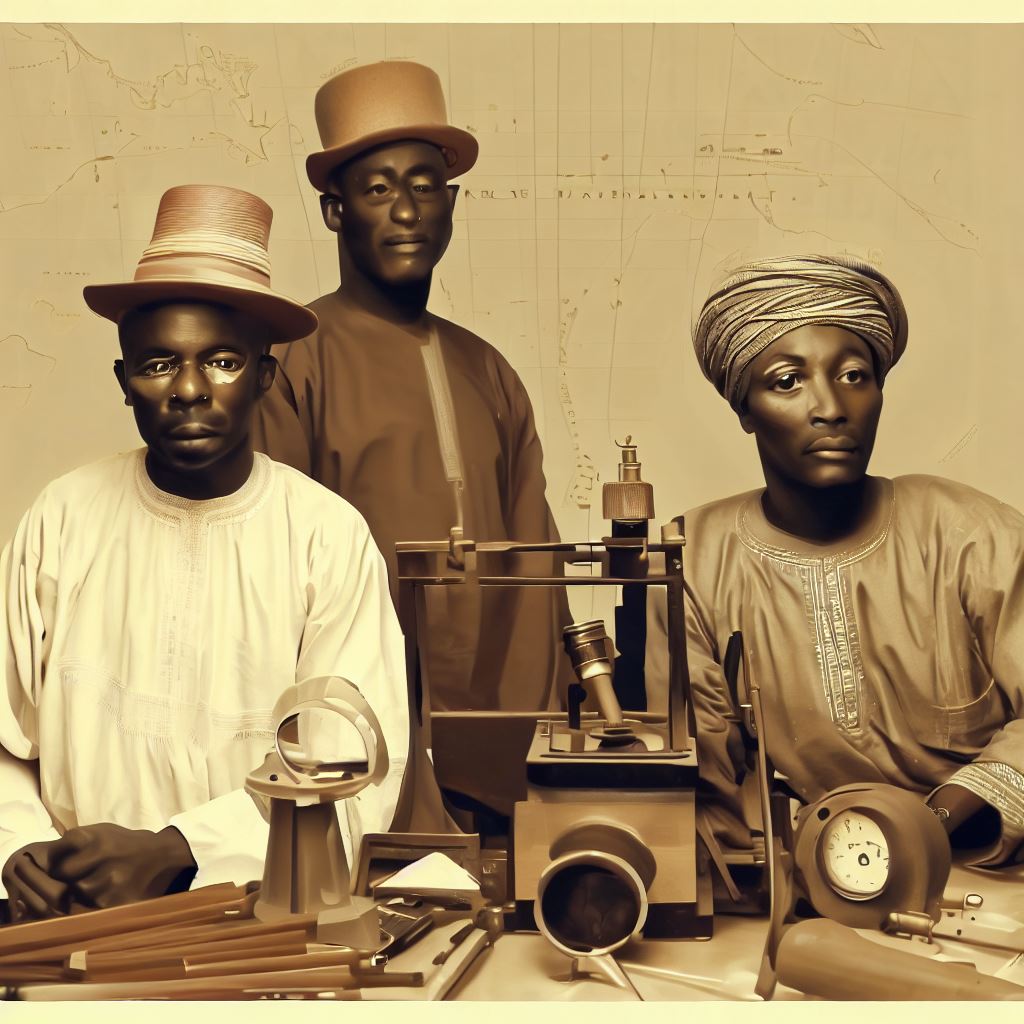Introduction
A. Brief overview of the topic
The topic of education for space scientists in Nigeria is of great significance and potential.
B. Importance of education for space scientists in Nigeria
Education plays a vital role in nurturing and developing talented individuals who can contribute to space science advancements.
C. Thesis statement: This blog post aims to explore the pathway to education for space scientists in Nigeria
Education for space scientists in Nigeria is crucial for the country’s development and global contribution towards scientific advancements.
Nigeria, as a country with vast potential and resources, needs to invest in education for space scientists to foster innovation and growth.
The importance of education for space scientists in Nigeria cannot be overstated.
Education equips future scientists with skills and knowledge to explore the universe, conduct research, and advance space science technology.
Investing in education enhances Nigeria’s capacity for global space missions and elevates its global standing in the field.
To achieve this, Nigeria needs to establish a clear pathway for aspiring space scientists.
Specialized programs, more funding, infrastructure, and resources will strengthen space science education in Nigeria.
Additionally, collaborations with international space agencies and institutions can further enhance educational opportunities for Nigerian space scientists.
In fact, education for space scientists in Nigeria is a pathway that holds immense potential for both the country and the individuals involved.
Recognizing education’s significance empowers Nigerians to pursue space science careers and contribute to knowledge and technology advancement.
With the right investment and support, Nigeria can position itself as an important player in the global space science community.
Current State of Education in Nigeria
A. General overview of the education system in Nigeria
- Nigeria’s education system consists of basic education, secondary education, and tertiary education.
- Basic education includes six years of primary school and three years of junior secondary school.
- Secondary education comprises three years of senior secondary school.
- Tertiary education is provided by universities, polytechnics, and colleges of education.
- Primary education is free and mandatory, while secondary and tertiary education require tuition.
- The education system is overseen by the Federal Ministry of Education and State Ministries of Education.
- Nigeria’s education system faces numerous challenges that hinder its progress and effectiveness.
B. Challenges and limitations faced in science education
- Inadequate funding allocated to the education sector affects the quality of science education.
- Lack of qualified science teachers hampers the delivery of quality education in science subjects.
- Inadequate science laboratories and equipment limit practical learning experiences for students.
- Theoretical focus in science education sidelines practical application, hindering critical thinking.
- Outdated curriculum fails to keep up with emerging trends and advancements in the field of science.
- Insufficient educational resources, including textbooks and reference materials, impede learning.
- Gender inequality in the education system hampers the participation of girls in science education.
- Poor infrastructure and overcrowded classrooms create a challenging learning environment.
- Lack of awareness and promotion of science-related career opportunities discourages students.
C. Impact of these challenges on space science education
- The general challenges in Nigeria’s education system directly affect space science education as well.
- Inadequate funding limits the establishment and development of space science programs.
- Lack of qualified space science teachers hinders the proper delivery of specialized knowledge.
- The absence of well-equipped space science laboratories restricts practical learning experiences.
- An outdated curriculum fails to address the contemporary knowledge and advancements in space science.
- The scarcity of educational resources on space science impedes comprehensive learning.
- Gender inequality poses a barrier to girls’ participation in space science education.
- Poor infrastructure and crowded classrooms hinder the effective teaching and learning of space science.
- The ignorance of space science-related career opportunities discourages students from pursuing this field.
In short, the current state of education in Nigeria faces various challenges that impact not only general education but also space science education.
The lack of funding, qualified teachers, proper infrastructure, and educational resources hampers the delivery of quality education in the field of science.
These limitations directly affect the growth and development of space science education in the country.
To promote space science education, Nigeria needs increased funding, improved teacher training, updated curricula, and gender-inclusive efforts.
By addressing these issues, Nigeria can strengthen its space science community, producing competent scientists for the country’s space sector.
Read: Space Technology in Nigeria: A Scientists’ Overview
Importance of Space Science Education
A. The significance of space science for Nigeria’s development
Space science education plays a crucial role in Nigeria’s overall development and progress.
- By investing in space science education, Nigeria can enhance its technological capabilities and competitiveness.
- Space research and exploration provide valuable data for various sectors, including agriculture, telecommunications, and climate monitoring.
- Understanding and harnessing space science can improve Nigeria’s ability to predict natural disasters and mitigate their impacts.
- Space-based technologies are essential for mapping resources, assisting in urban planning, and managing transportation systems.
- Nigeria can leverage space science to improve its healthcare services by utilizing satellite imagery for disease tracking and remote healthcare delivery.
- Space education fosters curiosity, critical thinking, and problem-solving skills among students.
- Exploring space science can inspire young Nigerians to pursue careers in STEM fields, driving innovation and economic growth.
B. Potential contributions of Nigerian space scientists to international space programs
- Nigerian space scientists can contribute to international space programs through collaboration and knowledge exchange.
- By participating in global space missions, Nigerian scientists can gain valuable experience and expertise.
- Nigeria’s inclusion in international space programs enhances its reputation on the global stage.
- Nigerian space scientists can bring unique perspectives and insights to solve global space-related challenges.
- International collaborations allow Nigerian scientists to access advanced technologies and expand their research capabilities.
- Through joint ventures, Nigerian scientists can contribute to advancements in space exploration and satellite technology.
- Collaborative efforts with other nations can lead to knowledge transfer and capacity building within Nigeria’s space industry.
- Nigerian space scientists can serve as ambassadors, promoting international cooperation and fostering goodwill.
C. Opportunities for research and innovation in space science
Space science education opens doors for research and innovation in various disciplines.
- Nigeria can establish research institutes focusing on space technology, astronomy, and astrophysics.
- Research in space science enables the development of new technologies, creating employment opportunities.
- Innovation in satellite design and manufacturing can lead to the growth of Nigeria’s space industry.
- Space-based research facilitates the exploration of celestial bodies, expanding humanity’s knowledge of the universe.
- Space science provides a platform for Nigerian scientists to pioneer groundbreaking discoveries and advancements.
- Investments in space science research can attract foreign partnerships and funding, boosting the economy.
- Space-based experiments offer opportunities for Nigerian students and researchers to contribute to scientific advancements.
In essence, space science education is crucial for Nigeria’s development, driving technology, international collaboration, and innovation.
By prioritizing space science education, Nigeria can position itself as a leader in space technology and reap the numerous benefits it offers.
Space is the final frontier, and Nigeria’s investment in space science education will pave the way for a brighter future.
Read: Nigeria’s Space Missions: The Scientists Behind Them

Educational Pathway for Aspiring Space Scientists
Aspiring space scientists in Nigeria can follow a structured educational pathway to achieve their dreams.
This pathway involves steps that start in high school and continue through postgraduate studies, with potential scholarships and grants available for support.
A. Preparing in high school
High school is the foundation for future success in space science. To prepare for a career in this field, students should focus on excelling in science and mathematics.
These subjects form the building blocks of space science and will provide a strong academic background.
In addition to academic excellence, high school students interested in space science should also participate in extracurricular activities related to the field.
Joining science clubs, participating in science fairs, and attending space science workshops or camps can provide hands-on experience and deepen understanding.
B. Pursuing a specific field in undergraduate studies
After high school, aspiring space scientists can pursue a specific field in undergraduate studies.
Nigerian universities offer programs in space science, such as astrophysics, aerospace engineering, or planetary science.
Students should research and choose a program that aligns with their interests and career goals.
During their undergraduate studies, students should actively seek research and internship opportunities in the field of space science.
These experiences can provide practical knowledge, enhance skills, and build a professional network.
Participating in research projects or internships will also demonstrate a strong commitment to the field on graduate school applications.
C. Continuing education through postgraduate studies
For aspiring space scientists, postgraduate studies are essential in deepening knowledge and specialization.
Students can pursue Master’s programs in specific areas of space science to gain advanced expertise.
Research and publication requirements are typically part of these programs, allowing students to contribute to the scientific community and advance the field.
D. Potential scholarships and grants for space science education
Nigeria offers various scholarships for students pursuing space science education.
Government scholarships, such as those provided by the National Space Research and Development Agency (NASRDA), can offer financial support to deserving students.
These scholarships often cover tuition fees, research expenses, and living allowances.
Additionally, aspiring space scientists can explore international scholarships and collaborations.
Organizations like the European Space Agency (ESA) offer scholarships and research opportunities for students from around the world.
The National Aeronautics and Space Administration (NASA) also offers scholarships and research opportunities for students from around the world.
These programs provide access to cutting-edge facilities and global networks.
Most importantly, the educational pathway for aspiring space scientists in Nigeria involves a series of steps that start in high school and continue through postgraduate studies.
By excelling in STEM, joining extracurriculars, picking relevant majors, gaining research experience, and pursuing financial aid, students can excel in space science careers.
Read: Nigeria’s Space Programs: A Scientist’s Perspective
Challenges and Solutions
A. Funding and resources limitations
1. Government investment in space science education
Governments worldwide recognize the significance of space science education and invest in it to foster scientific innovation. Nigeria, too, acknowledges its importance.
Governments can allocate substantial funds to educational institutions, specifically targeting space science programs and research.
This financial infusion boosts the development of space science courses and cutting-edge research projects.
Moreover, governments can establish dedicated space science research centers and institutes. These hubs become hubs of innovation and knowledge sharing.
Government-sponsored scholarships and grants provide financial aid to aspiring space scientists.
These opportunities make space science education accessible to a wider range of students.
2. Private sector collaborations and sponsorship
Beyond government investment, private sector collaborations and sponsorship are invaluable resources in the space science education landscape.
Private companies can partner with educational institutions to create specialized space science programs.
These programs align with industry needs, ensuring graduates are workforce-ready.
Sponsorships from private entities enable the procurement of advanced equipment and technology.
State-of-the-art laboratories and observatories enhance the quality of space science education.
Additionally, private sector partnerships offer real-world research opportunities for students.
Private sector involvement also benefits students through mentorship and internships, offering valuable industry experience and career preparation.
B. Enhancing the quality of science education
1. Curriculum improvements and practical training
Enhancing science education in Nigeria means improving curricula and practical training for a more effective learning experience.
Curriculum updates are vital to stay current with global science advancements, ensuring students receive relevant and comprehensive education.
Practical training bridges the theory-application gap in science. Labs and fieldwork offer hands-on experience crucial for students.
More labs enhance understanding. Students perform experiments, apply theory, and deepen their grasp of scientific principles.
Fieldwork enhances skills and curiosity. Students explore, gather data, and solve problems in real-world settings.
2. Teacher training and professional development
Equally important is investing in the professional growth of science educators. Teachers are crucial in shaping young minds and fostering future scientists, and they require continuous support.
Teacher training should focus on modern teaching methods, classroom management, and technology use. Well-equipped teachers can inspire students and make science exciting.
Professional development empowers teachers to stay updated with the latest research, fostering curiosity and inquiry in students.
Collaboration between educators and scientists can enhance science education, bridging academia and K-12 education.
In summary, improving science education in Nigeria requires curriculum enhancements, practical training, and strong teacher development.
These investments empower the next generation of scientists, ensuring a brighter future.
C. Encouragement of student interest in space science
1. Awareness campaigns and outreach programs
Awareness campaigns make the cosmos come alive for students. These captivating initiatives ignite curiosity about the universe.
Outreach programs bring space science closer to home. Hands-on experiences, like stargazing events, ignite the spark of fascination.
2. Mentoring and career counseling initiatives
Mentoring plays a pivotal role. Seasoned astronomers guide young minds, sharing wisdom and knowledge on space’s mysteries.
Career counseling initiatives are crucial. They help students chart a path in space-related fields, showing them diverse opportunities.
Space-themed clubs are exciting hubs. They foster a sense of belonging among like-minded space enthusiasts.
Interactive workshops engage students actively. Hands-on experiments and simulations make space science tangible and relatable.
Read: Space Science in Nigeria: A Growing Field of Study
Success Stories and Role Models
A. Notable Nigerian space scientists
- Dr. Sanda Oyazi Wai: He is a renowned astrophysicist and the first Nigerian to work at NASA.
- Dr. Olufunmilayo Olopade: She is a geneticist and space medicine expert, recognized globally for her contributions.
- Dr. Francisca Okeke: She is a professor of physics and the first female head of the Nigerian Academy of Science.
B. Their educational journey and achievements in the field
- Dr. Sanda Oyazi Wai pursued his education in physics and astrophysics, gaining a Ph.D. from a prestigious international institution.
- Dr. Olufunmilayo Olopade studied medicine and genetics, specializing in space medicine and pioneering studies on the effects of space travel on human health.
- Dr. Francisca Okeke excelled in physics during her undergraduate years and continued her research in geophysics and space science.
C. Inspiring future generations of space scientists through their stories
- Their achievements serve as a testament to the potential of Nigerian scientists in the field of space exploration.
- By sharing their stories, aspiring space scientists can learn from their experiences and gain insights into the path towards success.
- Their dedication, hard work, and perseverance can motivate young Nigerians to pursue careers in space science.
- The success stories of these Nigerian space scientists debunk the misconception that space science is inaccessible to Africans.
- Through mentorship programs and workshops, current space scientists can inspire and guide future generations in Nigeria.
Generally, Nigeria has produced notable space scientists, such as Dr. Sanda Oyazi Wai, Dr. Olufunmilayo Olopade, and Dr. Francisca Okeke.
Their educational journeys have showcased the importance of pursuing relevant fields of study and conducting groundbreaking research.
By sharing their stories, these role models inspire and motivate future generations to explore careers in space science.
With continued efforts in promoting education for space scientists, Nigeria can contribute significantly to global space exploration and make its mark in the field.
Conclusion
Space science education plays a crucial role in Nigeria’s development and progress in the field of astronomy and astrophysics.
It provides the necessary knowledge and skills for aspiring scientists to contribute to space research and exploration.
Publish Your Professional Profile, Business or Brand
Showcase your expertise, gain trust, and boost visibility instantly on Professions.ng.
Publish NowAspiring space scientists can follow a clear educational pathway in Nigeria, starting with a bachelor’s degree in physics or related disciplines.
They can then pursue a master’s degree and a Ph.D. in astrophysics or space science. Additionally, they can join research institutes and collaborate with international institutions.
To foster ongoing success in space science education in Nigeria, increased investment and support from various stakeholders are essential.
This includes funding research projects, establishing specialized space science institutions, and providing scholarships and grants for aspiring space scientists.
Recognizing space science education’s importance and substantial investments can position Nigeria as a global leader in space research.




